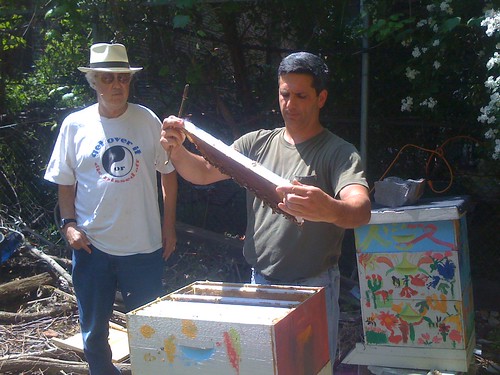I would like to start beekeeping. Any tips or suggestions would be appreciated.?

Image by Salim Virji
Beekeeping in Alphabet City
Question by sophielina: I would like to start beekeeping. Any tips or suggestions would be appreciated.?
I would really like to start my own bee farm. Nothing big, just 1 beehive. I looked online, but I couldn’t find what I was looking for. Could someone make a list of steps that I could follow? I’ve never worked with bees before, and I don’t want to do it for industry, just a fun pasttime. Are there any tools I need? Etc? Thank you in advance.
Feel free to answer in the comment section below

Dont get stung
citygirl22_1
October 15, 2011 at 5:17 am
Oh my! Beekeeping can be rewarding, but there is a LOT you will want to learn.
Equipment (and terms):
bee suit (all white)
helmet and veil
thick rubber gloves (sting proof)
smoker (special tool to blow smoke on the bees to calm them)
hive tool
bee supers (wooden boxes for bee house)
frames (to put in the boxes and hold the honeycomb)
To get started, you can buy a colony, and then buy the queen separately, to put in a hive. (Government regulations prevent shipping the queen with a colony.) When you get the queen, put her WITH her little screened wooden box inside the hive. DO NOT take her out. Let the bees eat their way through the sugar cube to get inside to her and let her out. By the time they have done this, they will have become friends and will not kill her. Hive should have a minimum of two supers filled with frames, and the frames should either have the honecomb, or have a foundation wax for starting the comb. For a startup hive, it’s much better if you can find at least one super with the honeycomb built already, so the queen can begin laying eggs for the brood.
Depending on your area, you might be able to “catch” a swarm. Sometimes bees naturally split, and a swarm will follow one or more queens to found a new colony in a suitable location. By presenting your hive to them, you can hope they’ll move in.
Bees make a mental map of their surroundings which can extend up to 5 or 10 miles radius. If you move the hive, you must move it at night, when all the bees are inside, and you must move it more than 5 miles away, or you will probably lose all of your worker bees, who will go back to the original site.
I could write a book for you here, but why? Just buy the book “First Lessons in Beekeeping” by C. P. Dadant. It will tell you all you need to get started in a nice, easy to understand format.
AsiaWired
October 15, 2011 at 6:02 am
First…find a new queen bee!
Beekeepers are the usual source of new queens, ans know when the bees are about to swarm, so they can be collected and moved to a new home, which is what they would do anyway. You can’t just set up a beehive. You have to know what kinds of plants are available in your area and what kind of bees would be appropriate.
I can’t believe you could not find anything on the web. You need to improve your web skills, or you didn’t try very hard.
It is not easy being a beekeeper, so check it out carefully. One bad storm can wipe out your hive and you have to start all over again.
thylawyer
October 15, 2011 at 6:03 am
In my area of the Catskill mountains of New York State we have a beekeeper organization. Ask around. If you have a local Farmers Market ask the honey venders for info and about a local beekeepers association. Try asking the local librarian. Or contact your local Cooperative Extension. They may have free leaflets on beekeeping or be able to point you in the right direction for info.
elizaatfalls
October 15, 2011 at 6:43 am
A good website to start with is
gobeekeeping.com
It has free online classes and lots of basic info, plus you can email the webmaster for specific information.
I would suggest that you contact your local Farm Bureau, 4H, beekeepers association, Agricultural Extension, etc. to find out who keeps bees in your local area. Hands-on experience will be a lot more valuable to you than just reading about it, and a local beekeeper may very well be happy to have you help out a bit so you can learn the basics and see if this is something you really want to pursue.
sonomanona
October 15, 2011 at 7:39 am